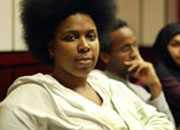
Faye Cummings, secretary of Concordia's chapter of the National Society
of Black Engineers (NSBE). Guled Hussein (middle) and Nayab are in the
background.
Photo by Andrew
Dobrowolskyj
|
by Melanie Takefman
Education, unity and sustainable development are critical concerns for
black students, according to the organizers of this year’s Black
History Month events at Concordia.
Black History Month, a celebration of the history, culture and identity
of black people around the world, is being marked throughout the month
of February at Concordia by events including a science exhibit, a fair
of art, poetry, food and dance, and a lecture series.
The emphasis of this year’s events will be on education. Ina Cassell,
the president of UMOJA, the African Student Union of Concordia, said that
black juvenile delinquency stems from a lack of positive role models and
promotion of education among black youth. Because of the prevalence of
negative portrayals of blacks, young people “don’t see themselves
having a future,” Cassell said.
The black person as athlete or entertainer is a common stereotype, said
Faye Cummings, secretary of Concordia’s chapter of the National Society
of Black Engineers (NSBE). As a result, many young people believe that
this is the only way that they can succeed in life.
For example, both black students featured in Concordia’s public transit
advertisements are identified as varsity athletes.
However, three black students, who are not varsity athletes, as well as
two staff members and one professor are featured in other advertisements.
Thus, the goal of the “Visions of Science” exhibit, which included
a display of African inventions, on Feb. 9-10, is to foster self-esteem
and expose youth to career opportunities in science. Jobs in the sports
and entertainment industries are not necessarily sustainable, but “science
is something that will always be there,” Cummings said.
She added that there are very few black students in her engineering courses
at Concordia. Generally, “when you’re the only one of your kind,
you feel alone,” Cummings said. ‘”It’s very hard to
learn on your own.”
Moreover, there is a lack of solidarity at the university as a whole.
Because no central black association exists at Concordia, students have
little leverage, no one to advocate on their behalf and no support system.
To remedy the situation, Cassell envisions an “afrocentric village”
that would support black students at Concordia in the promotion of their
rights, academics, and other aspects of campus life. The centre could
also extend to Montreal’s black community. She pointed to the Centre
for Native Education as a model.
“People need to know how to manoeuvre in a society,” Cassell
said. We “don’t have a sense of belonging, a sense of home.”
She attributed blacks’ spiritual disorientation to the “horrific
holocaust” that occurred when Africans were forcibly removed from
their countries hundreds of years ago and dispersed around the world.
“We are paying every day for that crime,” Cassell said.
Likewise, Cassell supports the creation at Concordia of an African Studies
program headed by black educators. Black people can teach their own history
effectively, she said. “We need to find out about our own history
before other people teach us about it.”
Another element of the afrocentric village would be links to Africa, like
sustainable projects with AIDS children.
While black students at Concordia don’t always work together, organizers
of this year’s Black History Month events have demonstrated “a
good deal of co-operation,” according to a member of the Muslim Students
Association (MSA), who gave only her nickname, Nayab.
Guled Hussein, Black History Month co-ordinator for UMOJA, hopes that
this year’s activities will serve as a “road map” for future
student organizers. In fact, this year’s multitude of activities
is an improvement over last year, when only a few lectures acknowledged
Black History Month.
Black History activities 2003
Open to the public
Feb. 14:
Poetry reading, 2030 Mackay St., first floor, 7-10 p.m. The Graduate Students’
Association presents a poetry reading with Benadette, Ophelia and Serena.
Light refreshments served. For information, call Celine at 848-7900.
Feb. 15:
Celebrating the Richness of Black Culture, Hall Building Mezzanine, 11
a.m.- 8 p.m. Black Women on the Rise present an art exhibition, story
reading, poetry, mask-making, dance, food-tasting and more.
Public lecture by human rights activist Imam Khalid Griggs on “What
They Didn’t Teach You About Black History.” 6 p.m. Hall Building,
H-110. Presented by UMOJA and the Muslim Students’ Association.
Feb. 21-23:
Iced in Black: Canadian Black Experience on Film, a festival co-hosted
by UMOJA and QPIRG McGill. Chocolate City, a film by Concordia alumnus
Stefan Verna, will be screened on Feb. 21. For film schedules and additional
information, visit http://www.icedinblack.ca.
For general information, contact UMOJA at 848-3530 or visit http://umoja.concordia.ca.
|
|
|



